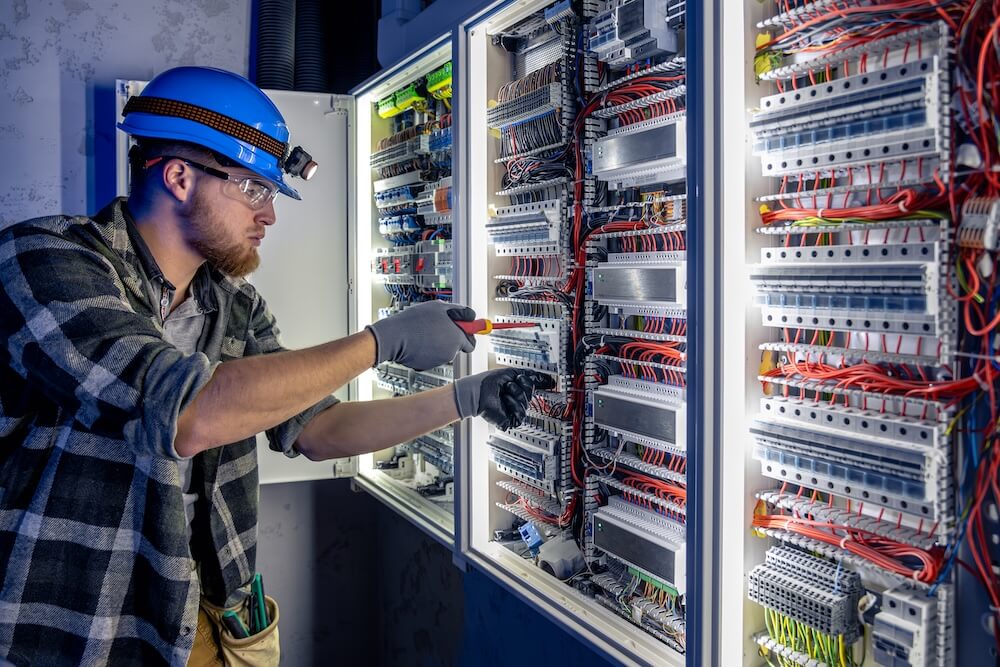An electrical system is a crucial component in any building, ensuring safe and even distribution of power. However, one common issue that’s often overlooked is electrical overload, a condition that poses significant risks if not addressed properly. Despite its importance, many people still don’t fully understand what an overload is and the dangers it brings. If you’re looking to learn more, here’s everything you need to know about electrical panel overloads.
At Prima Panel Nusantara, we specialize in helping clients prevent such risks through certified low-voltage (LV) panel solutions, including BlokSeT by Schneider Electric, which are designed for scalable, high-performance, and safe operations. Here’s what you need to know about overloads and how to stay protected.
What is Electrical Panel Overload?
An electrical panel overload happens when the current flowing through the panel exceeds its designed capacity. When this occurs, it can trigger major electrical issues — such as frequent circuit breaker trips (MCB), overheating of wires, and even fire hazards.
Common signs of electrical overload include:
- Flickering or dimming lights
- MCB frequently tripping
- Heat buildup around the electrical panel
Overload often happens when more electrical devices are used than the system was originally designed without upgrading the panel. That’s why it’s important to recognize early symptoms and understand the root causes.
Common Causes of Electrical Overload
- Exceeding System Load Capacity
Using appliances or equipment that exceed the electrical system’s limits (MCB, cables, cable lugs, insulation) can lead to overloads. Early signs include frequent MCB tripping, hot cables, or burnt insulation.
- Undersized Electrical Panel or MCB
If your circuit breakers (MCB) are too small for your current power needs, electrical overload can happen easily.
- Uneven Load Distribution
When one circuit handles too many devices, the power load becomes concentrated, causing overheating.
- Incorrect Cable Sizing
Using cables that are too thin for the electrical load can lead to excess heat and eventual system failure.
- Faulty Equipment
Broken or shorted appliances often draw higher current than normal, speeding up electrical panel overload.
Prima Panel Nusantara offers certified Low Voltage panel systems designed to meet IEC 61439 standards. Engineered using Schneider Electric components, our panels ensure even load distribution, easy inspection, and long-term reliability under demanding conditions. Explore our products to find the right solution for your electrical system.
How to Prevent Electrical Panel Overload
To manage and prevent overload in electrical panels, here are some essential steps:
- Evaluate Electrical Load
Calculate the total power used by all connected devices and match it with the panel’s circuit breaker capacity.
- Use the Right Circuit Breaker
If power demand increases, replace the breaker with one of higher capacity — but always follow safety standards.
- Distribute Load Across Circuits
Avoid putting heavy loads on a single line. Spread them across multiple circuits.
- Use Standard-Compliant Cables
Ensure the cable size and quality match the current to prevent overheating.
- Hire a Certified Technician
Always involve a certified technician for inspection and repairs. Avoid handling it yourself without technical knowledge.
Prevent electrical overload with Prima Panel Nusantara’s expert load analysis, modular BlokSeT panels, and certified components. We also provide inspection and upgrade services to keep your system safe and efficient. Explore our services here.
Tips to Prevent Electrical Overload
- Use energy-efficient appliances.
- Avoid plugging too many devices into a single socket.
- Regularly inspect your electrical panel and wiring.
- Ensure all electrical equipment is certified and meets safety standards.
Electrical overload isn’t just about inconvenience, it’s a real safety hazard. By understanding what electrical overload is, identifying the causes, and applying proper prevention, you can keep your home or business safe and efficient. Always ensure your system is well-designed and regularly maintained to avoid serious risks from electrical panel overload.
For reliable, certified solutions, visit Prima Panel Nusantara’s product page or contact our team to find the best panel system for your needs.







